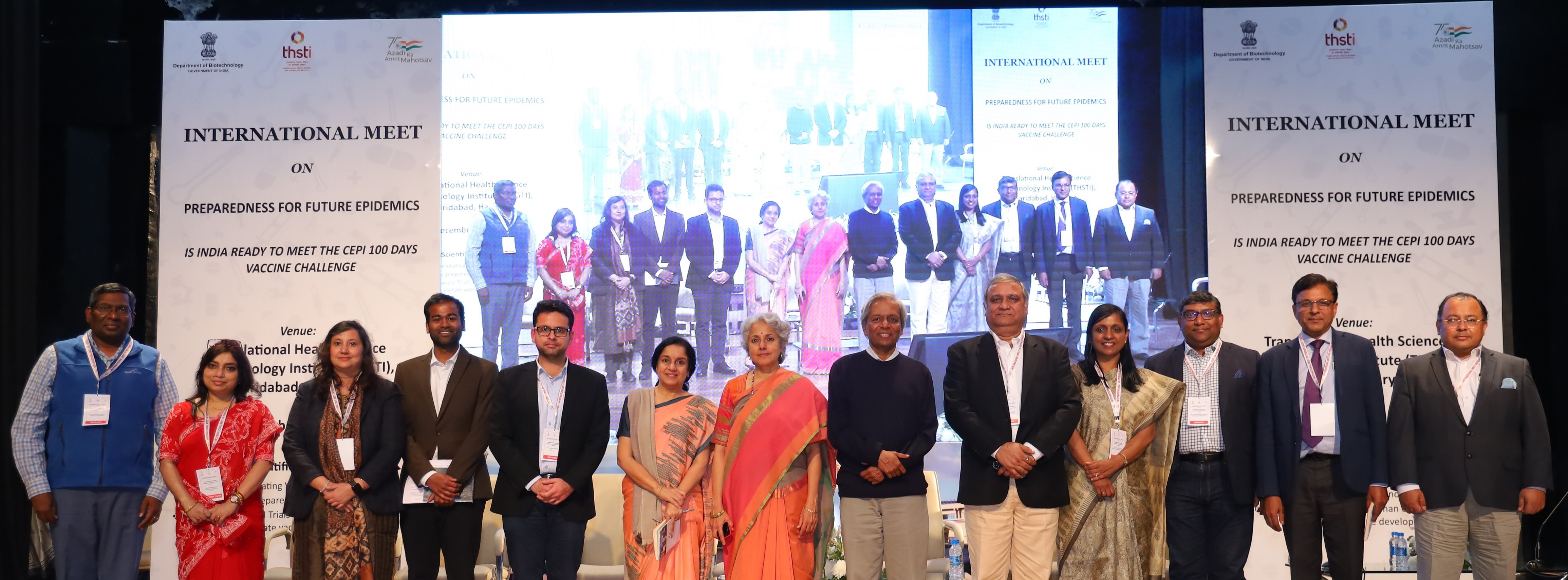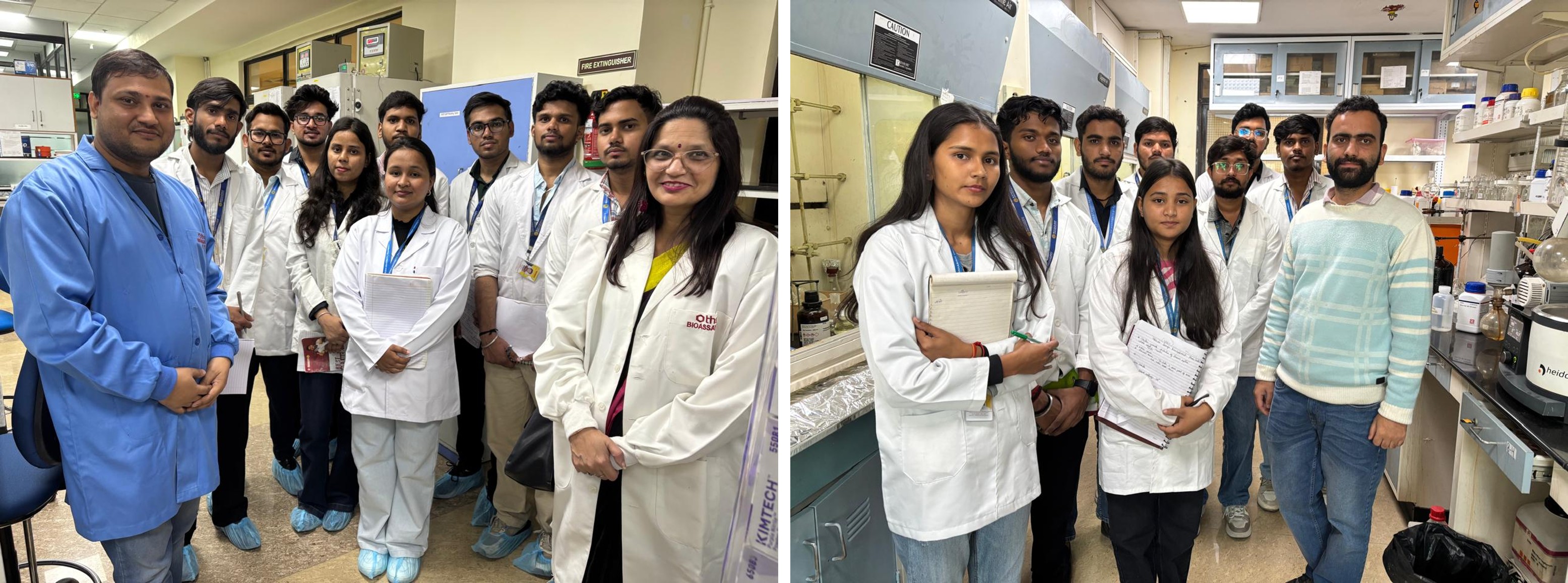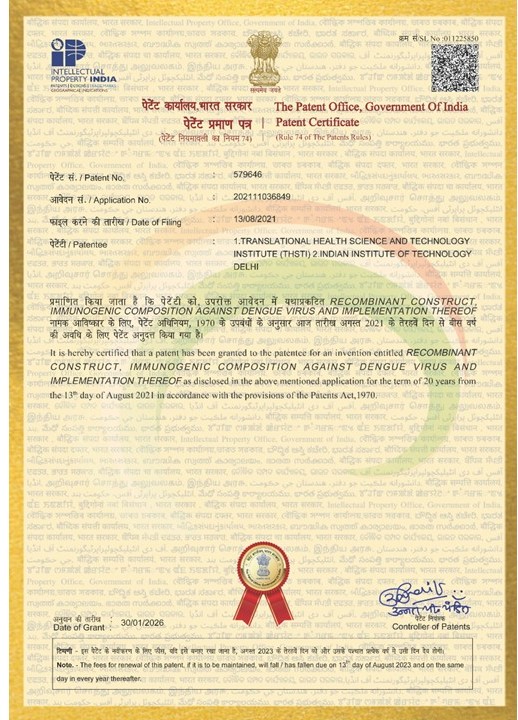International Meet on PREPAREDNESS FOR FUTURE EPIDEMICS
An International Meet on “Preparedness for Future Epidemics: Is India ready to meet the CEPIU 100 days vaccine challenge?” was organized by Translational Health Science and Technology Institute (THSTI) from 5th-6th December 2022 in its campus.
Honourable Union Minister, Dr. Jitendra Singh Ji, in his message to the the conference said that India will make significant investment in R&D to develop a roadmap for design and delivery of vaccine development for future pandemic. Dr. Singh said, while efforts are still on to uncover findings about the COVID-19 and the epidemiological models, India is ready to invest in future challenges. He said, the Department of Biotechnology was at the center of pandemic response and took unprecedented steps to curb the threat posed by COVID 19. He also said, DBT was aided very ably, by its 14 autonomous institutes, the primary lead taken by THSTI as it quickly set up patient cohorts, bioassay systems, immune and cellular response assays, animal studies required for vaccine development, and supported vaccine industry in developing India's first DNA and protein subunit vaccine Corbevax. Dr Singh also said that it is timely that Department of Biotechnology and THSTI are leading India's IndCEPI program for future preparedness.
This meeting brought together leaders and experts from academia, industry and regulators to discuss important aspects of vaccine development for emerging infectious diseases. India as a country will take lead in providing a policy framework for pandemic preparedness especially for global south, aligning respective national regulatory processes with international processes, and enhancing and pooling manufacturing capacity for large scale production quickly. This will also help the country to garner the strength of our biotech industry to improve human health and also contribute to our economy beyond its current share of $80 billion.
Dr. Rajesh Gokhale, Secretary, DBT, reiterated DBT’s commitment to foster enterprise and innovation with new and special emphasis of enhancing manufacturing and bio-manufacturing. He added that the process for vaccine preparedness was complex and DBT would facilitate with putting into place easier scientific policy on place. The need for synchronized system such that India can combat disease dengue, Chikungunya, TB and other viral/bacterial infection, bringing more proactive solution in means of vaccine, diagnostics, curative therapeutics quickly.
Prof. Pramod Garg, Executive Director, THSTI highlighted the work that THSTI has been doing in various R&D fields. Dr. Garg spoke briefly about the clinical cohorts, vaccine effectiveness studies, pan-hospital network studies, diagnostic modalities and in-house vaccine development research on infectious diseases such as SARS-CoV-2, TB, Dengue, etc. He mentioned about the newly launched MSc in Clinical Research program. Prof. Garg also emphasized having synergy between academia and industries and informed the audience that THSTI has recently got a $12 million funding from CEPI for a collaborative work on developing pan beta corona vaccine in collaboration with industry. He said that THSTI is ready to meet the academic component of the challenge of developing a new vaccine.
The keynote address was delivered by Prof. K. Vijay Raghavan, former Principal Scientific Advisor to the Government of India. He spoke about the challenges posed by the CEPI’s 100 Day challenge and the role of public health information and data flow systems, vaccine platforms, preclinical facilities, animal experiments, regulatory system, implementation system and funds in pointing out the processes for meeting these challenges that are critical. He cautioned that while we were lucky to have a strong immunogenic spike protein antigen for the corona virus, this may not be the case with other infections. Therefore, developing a sustainable and economically viable system flow for achieving100 day challenge was critical.
Dr. Soumya Swaminathan, Chief Scientist, WHO emphasized the need for India to develop road maps and target product profile for diseases important for India. She mentioned that WHO had set up a committee to prioritize viral families and pick prototypes from these families for vaccine development. For a better and more equitable approach to vaccine development and access, it was important to be collaborative, have globally aligned regulatory processes and an ethical public health policy in place.
Experts from the academia, industry and regulators viz., Leiden University Medical Center, The Netherlands, Emory University USA, IISc Bangalore, CMC Vellore, THSTI, ICMR, CDSCO, WHO, CEPI, Serum Institute of India Pvt. Ltd., Zydus Life Sciences, Bharat Biotech International Ltd., Premas Biotech Pvt. Ltd., Biological E Pvt Ltd., Panacea Biotech Ltd., & Gennova Biopharmaceuticals Ltd. made presentations during the meeting.
Capacity building, strong supply chains, academia-industry partnership, ideation banks in universities are some of the key takeaways of the International Meet to achieve faster vaccine development for emerging infectious diseases.


 20 Feb 2026
20 Feb 2026
 17 Feb 2026
17 Feb 2026
 10 Feb 2026
10 Feb 2026
 02 Feb 2026
02 Feb 2026